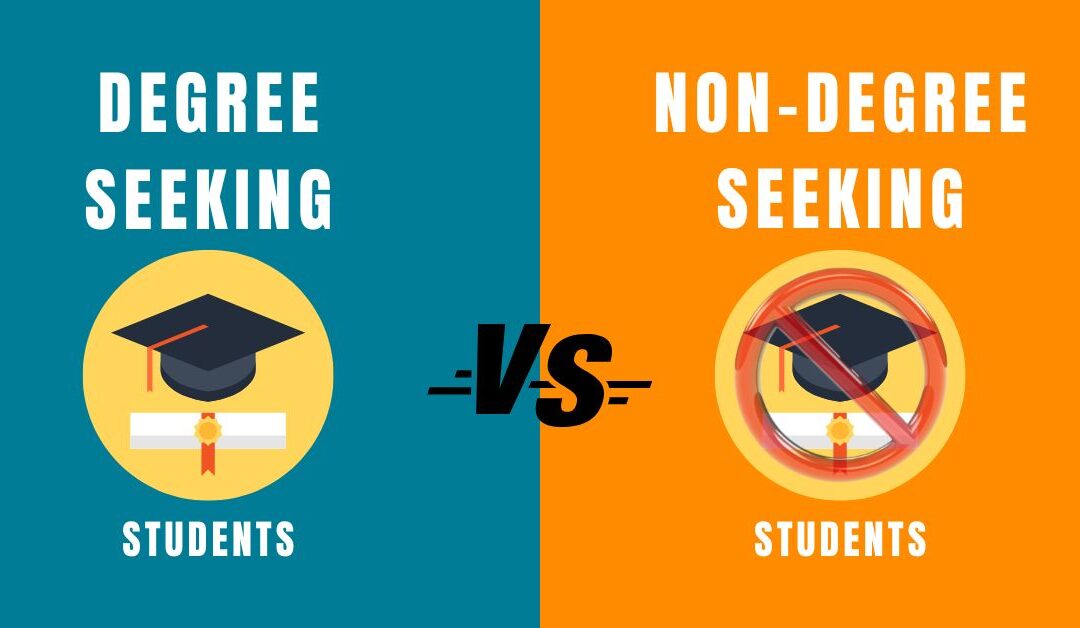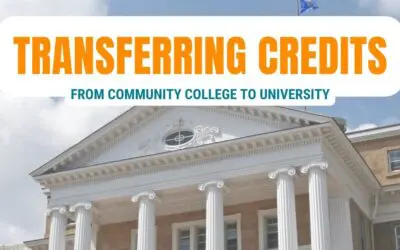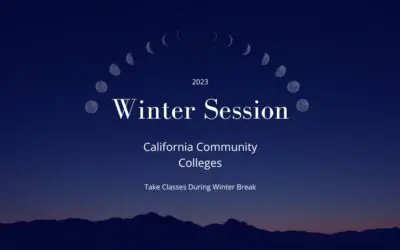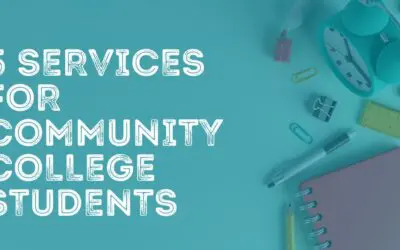Are you considering taking college courses without pursuing a degree? If so, you’re not alone. Non-degree seeking students are becoming more common in higher education as the cost of tuition rises and students look for alternative ways to gain knowledge and skills. In this blog post, we’ll explore what it means to be a non-degree seeking student, why some choose this path, and how they can benefit from it.
Whether you’re an adult learner looking to expand your knowledge or just curious about other options besides traditional degrees, read on to learn more about non-degree students!
I. Introduction
Gone are the days when a college degree was the only path to success. With more and more non-degree pathways being made available, individuals can now pursue education in ways that best suit their needs and wants.
From certificate programs to apprenticeships, these options offer an alternative route for those looking to expand their knowledge base or gain professional skills outside of traditional higher education.
Recommended Readings
Scholarships for Native American Students
The Associate Degree for Transfer: Your Gateway to a Four-Year University
Although this form of learning may be seen as unconventional by some, there are many benefits it offers students, including flexibility and cost savings.
However, before embarking on such paths, it’s essential to understand both its advantages as well as drawbacks so you can make informed decisions going forward.
Related: What Happens if You Mess Up in Community College?
Non-Degree Seeking Student Meaning
Non-degree seeking students are those who participate in college courses without receiving any academic credits.
Rather than focusing on earning a degree, non-degree seekers are often in attendance to gain knowledge and skills related to a particular topic or to prepare for an upcoming course they intend to enroll in.
Although their classes may have similar academic standards as those with credit, non-degree seekers usually receive a pass/fail grade instead of a numeric one.
Furthermore, non-degree seekers often have fewer course selections than those pursuing a degree at the same institution.
II. Reasons for Pursuing a Non-Degree Path
A. Time Commitment and Flexibility
Non-degree seeking students are often attracted to this path due to its lack of time commitment. Many non-degree seekers have other responsibilities or commitments outside of school that take priority.

Without the pressure of earning credits, they are able to commit as much or as little time as they’d like to their studies, allowing them to focus more on the content and less on deadlines.
B. Interest-Based Learning
Another common reason for choosing a non-degree path is interest-based learning. Non-degree pupils often use this option as a way to explore new topics without having to commit to lengthy courses or degree programs.
They can take individual classes for a fraction of the cost and gain valuable knowledge without having to worry about pursuing a degree in the field.
C. Career Advancement
Non-degree seekers may also use this path as part of their career advancement strategy. By taking courses related to their current job or potential future roles, they can gain skills and knowledge that will help them stand out in the job market.

Additionally, they may be able to get certifications that employers look for without having to invest in a full degree program.
Related: 5 Support Services to Boost Your Community College Success
III. The Pros and Cons of Being a Non-Degree Seeking Student
Pros of Non-Degree Seeking Student
There are a number of reasons why someone might choose to pursue a non-degree path.
For some, the cost of tuition can be prohibitive, and taking non-credit courses is an economical way to acquire knowledge and develop skills.
For others, time constraints—such as working full-time or having family obligations—can make it difficult to pursue a degree program.
Additionally, some students may want the freedom to explore different topics without the expectation of completing a full program.
Finally, in some cases, students may not have high school credentials or other qualifications that are required to apply for a traditional degree program.
A. Cost Savings
One of the biggest benefits of choosing a non-degree path is the cost savings. Non-degree seekers are not tied to long-term degree programs, so they can take individual courses as needed without having to pay for a full program of study.
This allows them to save on tuition costs while still gaining important skills and knowledge related to their field.
Recommended Readings:
The California College Promise Grant: Everything You Need to Know to Be Successful
Tulsa Community College | Admissions and Information
Cuyamaca College | California Community Colleges
B. Personal Growth
Likewise, non-degree seekers can use this path for personal growth and exploration. By taking courses that interest them, they can expand their knowledge base without having to worry about pursuing an entire degree program.
This allows them to explore topics they may not have encountered in their degree program and gain valuable skills that can help them grow as a person.
C. Customize Your Course Plan
Another pro of being a non-degree seeker is the flexibility it provides in terms of course selection.
Non-degree seekers are not bound to the same rigid course requirements as degree seekers and can choose from a variety of courses that fit their interests and current level of knowledge.
They have the ability to create their own personalized learning experience, allowing them to focus on topics that are most relevant to them.
Cons of Non-Degree Student
While there are many benefits to non-degree seeking, there are also some potential disadvantages.
A. Lack of Resources
One of the major cons of non-degree-seeking students is the lack of federal financial aid or on-campus housing opportunities.
As a non-degree seeking student, one cannot access most forms of federal financial aid, nor can one enjoy the benefits associated with living on campus.

Related: The Ultimate List of Community College Pros and Cons
This can be especially difficult for those who have limited resources and need assistance in paying for tuition and other educational expenses.
For example, non-degree seekers may not receive the same level of guidance and advice as degree-seeking students. Additionally, they may not benefit from internships, job fairs, and other programs that are available to bachelor’s degree-seeking students.
Similarly, there is a finite amount of in person classes available to non-degree pupils, and this does not include upper-level graduate courses or curricula in a graduate degree program.
Nonetheless, there are options for every non-degree seeking student or non matriculated students to take online classes for no college credit or credit hours.
Related: 8 Tips For College Transfer Students | Ultimate Strategy Guide
If you are a current high school student or recently graduated with a high school diploma, then it would be wise to forgo the non-degree pathway and instead focus on receiving undergraduate degrees (i.e., associate’s degree and bachelor’s degree).
Unlike degree students, non matriculated students will not receive the credentials of a graduate degree program nor a bachelor’s degree; it is purely for personal growth or a prospective boost in income or skills at your current position.
B. Absence of College Credit Opportunities
In addition, non-degree seekers will have difficulty transferring credits earned from their non-degree program to a bachelor’s degree program at another school. This can create complications if the student decides to pursue a full degree in the future.
Remember, even though you may enroll in non-credit courses, it is unwise to do so on the undergraduate level. This is because degree seeking students are given first priority over non-degree pupils on a space available basis.
Bypassing a bachelor’s degree program as a student can have serious consequences, especially if one decides to pursue college credit for their education in the future.
Thus, it is essential that students take this into consideration before making such an important decision. If you are denied admission from another institution and believe it is wise to take classes without the degree implications, then it is imperative that you are taking classes every chance you can, ranging from summer to spring semesters.
C. Lack of Employer Interest
Finally, employers may be less likely to recognize non-degree credentials, making it more difficult for non-degree seekers to land jobs. Employers are asking for more and more workers with bachelor’s degrees because it showcases a work ethic and willingness to finish something tangible.
In fact, a recent survey of business owners found that most of them favor individuals with a degree program completion over those who took courses but did not complete a degree program.
The lack of an officially recognized credential can put a non-degree seeking student at a disadvantage when applying for jobs. From the perspective of employment, there is no doubt that obtaining a bachelor’s degree is a significant achievement and will likely reap enormous rewards.
Overall, the pros and cons of being a non-degree seeker will vary from person to person. It’s essential for anyone considering this path to carefully consider their goals and weigh the advantages and disadvantages before deciding which route is right for them.
IV. Difference Between Degree & Non-Degree Seeking Students
The primary difference between a degree and non-degree seeking student is the type of goals they have in mind for their studies.
Degree-seeking students are pursuing academic credentials, such as an associate’s, bachelor’s, or master’s degree, to secure credentials that can enhance their career prospects.
The technical definition of a degree-seeking student refers to an individual who has been admitted and enrolled in a state educational institution, expressing their eagerness to complete an eligible federal financial aid program certified by the U.S. Department of Education.
Non-degree seeking students might be taking classes to gain general knowledge or to satisfy a specific interest without necessarily needing the resulting credential.
Degree-seeking students often pursue their studies full-time and may move through a curriculum with the goal of completing it in a set amount of time.
Non-degree seekers often take classes on a part-time basis and may customize their course load to fit their individual interests and needs.
Additionally, while degree-seeking students meet specific criteria to enroll in many institutions, non-degree seeking students typically only need to demonstrate that they meet the prerequisites of each class they wish to take.
VI. Conclusion
Overall, non-degree pathways can be beneficial for those looking to pursue an education that doesn’t necessarily require a degree.
However, it is critical to consider the potential drawbacks before making any decisions on this type of path. Non-degree seekers may need help accessing financial aid, transferring credits, and finding employment.
It is always best to be informed of all the potential pros and cons before making a decision. Ultimately, it will depend on each individual’s unique situation, interests, and goals.
For those looking to broaden their educational horizons without pursuing a degree program, non-degree pathways may be a great fit. With careful consideration of the benefits and drawbacks, non-degree seekers can find success in their educational pursuits.





